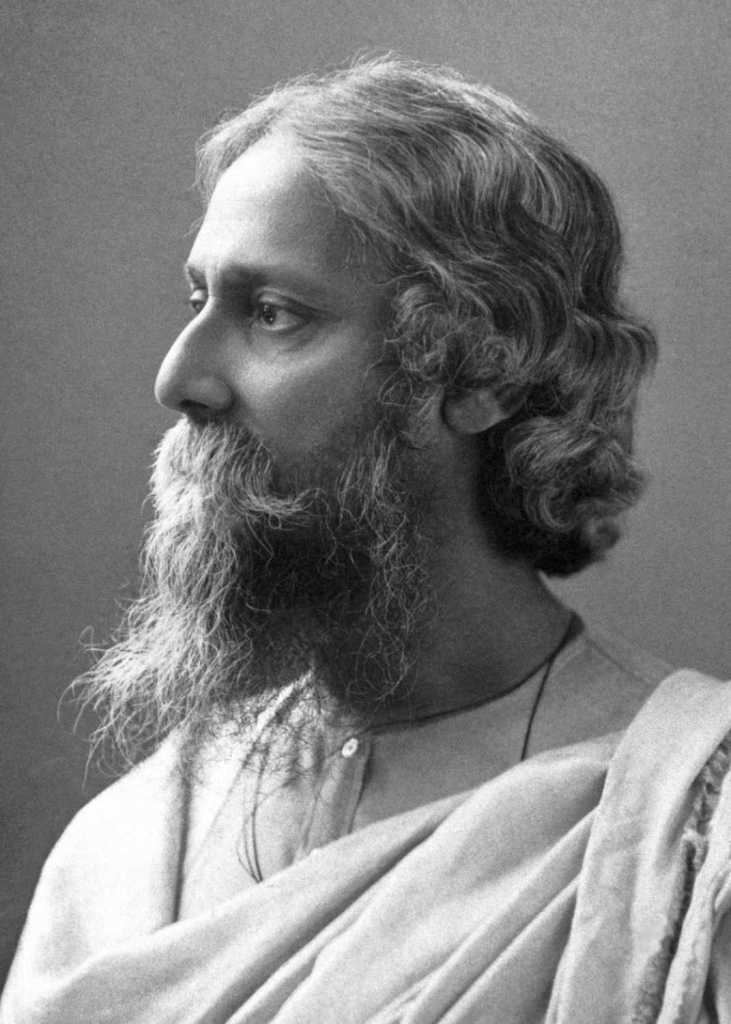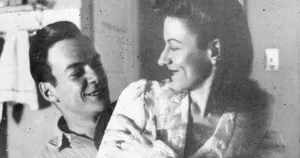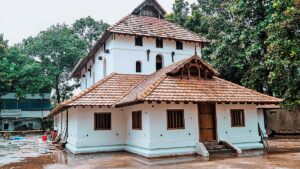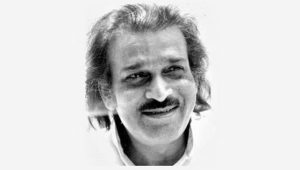Aruna Chakravarti in discussion with Sunil Gangopadhyay
[Rabindranath Tagore (1861 to 1941) was born on May 7th. He was a brilliant poet, writer, musician, artist, educator—a polymath—and of course, we all know of him as the first Nobel Laureate from Asia. His writing spanned across genres, across global issues and across the world.
Today to jubilate this great writer on his one hundred and fifty ninth birth anniversary, we have a conversation by two greats of our era. They, like Tagore, are from Bengal—both Sahitya Akademi award winners: Aruna Chakravarti, a writer who has translated his famed Gitabitaan, and she talks about the great poet with Sunil Gangopadhayay (1934-2012), a renowned Bengali author who authored a novel on Tagore in Bengali, Prothom Alo or First Light. Aruna Chakravarti has translated Gangopadhyay’s novel too and she also has her own novel on the Tagore family women, Jorasanko, which has been a best seller in India.
The conversation brings out the relevance of Tagore in the current day world and many more interesting details. It was part of the celebrations organised by Sahitya Akademi to jubilate the 150th birth anniversary of Tagore in Kochi in 2011.]
Aruna Chakravarti: Sunil da. You have maintained in a number of your public statements that, as a young writer, you had no great admiration for Rabindranath. Neither did your contemporaries of the Kallol group. You considered his work sentimental and archaic and wanted to get out of his shadow. Which you did by writing in a very original and dynamic way. Yet, now that you are in your seventies, we see in you a great admirer of Tagore. You have read his works conscientiously. And I’m told you can sing at least two lines of each of the two thousand songs composed by him. Not only that. You have made him the central character of your novel First Light and used the awakening of his poetic inspiration as a metaphor for the awakening of an entire nation. When and how did this change take place?
Sunil Gangopadhyay: Yes. We were rebels who wanted to write in a stronger, more down to earth and powerful language. We rejected Rabindranath as a model and had mixed feelings about his work. Some of his poems we thought were dated and some others were too long. But that does not mean we did not admire him. We did admire him particularly his lyrics which we knew, even then, would be immortal.
In one of my poems I have said that even if everything else Rabindranath has written dies out with time—his songs will live. My friends and I used to compete with each other as to who knew the greatest number of his songs. We would spend our evenings singing Rabindra Sangeet and reciting his poems. Some of us could recite reams of pages. But it is true that we admired him in private and rejected him in public. We made our dislike of the Rabindra scholars, who lionised him shamelessly, quite apparent. They declared that he was the last word. That the pulse of poetry had stopped with him. They turned him into a god.
We couldn’t accept that. We were young and hot headed and reacted strongly. And sometimes we used abusive language. One of my friends declared publicly that he had kicked out a collection of Rabindranath’s poetry. But, in reality, nothing like that had happened. And we hated the term Gurudev. Why Gurudev? Why such blind adulation?
Aruna Chakravarti: Has any of your work been influenced by Rabindranath’s?
Sunil Gangopadhyay: No. We tried, very cautiously, not to imitate Rabindranath and if we found the faintest traces of imitation in the work any of our friends, we ridiculed him.
Aruna Chakravarti: I don’t mean consciously. And I’m not referring to your early writing. Later, when you realised the value of his work, did it not rub off in any way? Subconsciously perhaps?
Sunil Gangopadhyay: Can any Bengali writer escape Rabindranath? I’ve learned the basics from him. Poetic structures, the use of rhymes and metres—from where else did I learn all this?
Aruna Chakravarti: Sunil da. Though you started writing while still in your teens it was exclusively in Bangla till 1987, when your novel Arjun was translated into English. Which makes it a little over a couple of decades that you started reaching out to a Western readership. Something similar happened to Rabindranath. He wrote from childhood upwards in Bangla then, suddenly, chose to turn bilingual at the age of fifty when he translated the lyrics of Gitanjali. Why do you think this happened? As I see it neither of you had any particular compulsions to make your work a part of the literature of the West. Please share your thoughts on this in the light of your own experience.
Sunil Gangopadhyay: Rabindranath had travelled widely by that time. He, as we all know, was the most widely travelled man of his times — a kind of roving ambassador for India. He had met many eminent men and women from other countries who were impressed with his personality and curious to know what and how he wrote. They urged him to translate his work. And he did so. That was the primary reason. His family didn’t think much of this endeavour. Dwijendranath Tagore, his eldest brother, writes in his Memoirs that one day he saw Rabindranath lying on his bed with books and papers spread out before him. On asking him what he was writing Rabindranath told him that he was translating some of his work because the sahebs wanted to read it. Dwijendranath was quite annoyed and told his younger brother, ‘If the sahebs want to read your work they should learn Bengali.’ People did not care for translations then. Bankim translated his own work but did not like them at all.
Aruna Chakravarti: And what about you? You have said, often enough, that you are perfectly content with your Bengali readership and with using Bangla as the sole language of your literary expression. Yet you did commission translations of your work. Why was this?
Sunil Gangopadhyay: Aruna, I must tell you that I’ve never, in my whole life, requested anyone to translate my work. People have done it. I have not stopped them. There is a reason for it. I consider myself a poor writer and believe that my books do not merit translation. I do my best but genuinely believe that a really good and perfect book still remains to be written by me. Besides my English is not so good. I can’t tell if the translation is worthwhile or not. You have done an excellent job. People who know English tell me that your translations are better than the originals.
Aruna Chakravarti: Really Sunil da! Please don’t embarrass me. But let’s move on from this to another point. From the advent of English education in India writers have sensed a tension within themselves regarding choice of language. Michael Madhusudan and Bankimchandra began their literary careers in English then switched over to Bangla. With Rabindranath the opposite happened. But not quite. He continued to write prolifically in both languages. But it seems as though he chose English for certain genres and Bangla for others. English—to express his ideas on politics, religion, education and philosophy. In short, he chose to use it as a language of communication with a wider world. But Bangla was the language of his heart. It was his language of communion—the language of his music and poetry. Here I’m reminded of the song Gaaner bhitor diye jakhan dekhi bhuvan khani (I see the universe through my songs) in which he concedes that it is only through his music that he can commune with God and all created things. And, though he doesn’t say so, the fact that he can do this only in Bangla is implicit. It is interesting to note that he did not write a single song in English. He could have done so. He was sufficiently knowledgeable about Western music and his English, too, was impeccable. We see traces of Western influence in some Bangla songs. But he never, ever, wrote an English song.
Sunil Gangopadhyay: Quite true. He loved Bengal and the Bengali language. He travelled to so many countries and wrote so much during those times. But the places he visited are conspicuous by their absence in his poetry. Even during his travels, the focus of his songs and lyrics were fixed, unwaveringly, on his own land. Wherever he went — be it Iran, Italy, England or Argentina — he never recorded his experiences there in song. Rather, whatever he composed during those times, reflected the melancholy of parting and a bitter sweet nostalgia for what he had left behind.
Another thing. Rabindranath always maintained that the English renderings were not good. And I agree. Leave alone the works of others, even his own translations are a feeble shadow of the original. Sometimes I wonder why Yeats and Rothenstein liked his English Gitanjali so much. It is nothing compared to the Bangla. And I don’t think his best work has been translated. There are no good translations of the poems of Balaka and Purabi. His works in English are remarkably slender. His work runs into 56 volumes in Bangla and in English we have only four.
Rabindranath may have been a world writer in his views, but he had the heart and soul of a Bengali. He loved Bengal and loved her language. During the Partition of Bengal in 1905, when the language was threatened, Rabindranath came out on the streets, for the first time in his life. He was not that type at all. He hated publicity. But he led his people in protesting against what he considered was an infringement on the lives of Bengalis and a move to crush them by diluting the power of their language. Fortunately, the Partition of Bengal did not happen in his lifetime. It happened six years after his death along with the Partition of India.
Aruna Chakravarti: Coming back to your comment that, during his travels, he never composed a song on the land in which he was staying, I am put in mind of the song he wrote in Germany once just before Durga Puja. He wrote Chhutir banshi bajlo… ami keno ekla boshe ei bijane (the holiday flute played… why am I sitting alone in this foreign land). Pure déjà vu! To move on to another aspect of Rabindranath’s engagement with the West — we know that Rabindranath fell back on the notion of Gurukul when he started his school in Shantiniketan. He conceived it as a brahmacharyashram with himself as Gurudev or Preceptor.
This was an expression of his lifelong discomfort level with the western system of education. He had fared badly in all the English schools to which he was sent including the ones in England. Yet Rabindranath responded enthusiastically to European literature, art and music and even studied the new scientific theories with interest from his early youth. The poetry he wrote in his teens was largely inspired by that of Dante and Petrarch. Another interesting fact is that he had not only read the major poets he was also aware of the obscurer ones. For instance, he had read the boy poet Chatterton and saw a close resemblance between himself and him…
Sunil Gangopadhyay: Bhanu Singher Padavali (Bhanu Singh’s verses)?
Aruna Chakravarti: Yes. This was particularly apparent when Rabindranath was writing the lyrics which were published as Bhanu Singher Padavali. Both young men were incurable romantics and obsessive dreamers who lived in a visionary world they half believed in. Like Chatterton, who concealed his identity behind that of the non-existent medieval poet Rowley, Rabindranath used the pseudonym Bhanu Singh — a non-existent Vaishnav poet. Do you see a contradiction between his absorbing interest in everything European and his rejection of it in terms of an educational process?
Sunil Gangopadhyay: Rabindranath couldn’t stand the rigid discipline of the British public school system. He hated confinement of any sort and the notion of being dosed with quantities of knowledge within the four walls of a school room was obnoxious to him. That is why he fared badly in all the English schools to which he was sent—both in India and in England.
Aruna Chakravarti: Yes. His brother Somendranath, who wasn’t quite normal as a boy and became distinctly unhinged in later life, fared better. But Rabindranath’s inability to benefit from a structured system of education wasn’t restricted to English schools. His brother Hemendranath, who had taken charge of the primary education of the children of Jorasanko, told his father often — Robi mon dei na (Robi doesn’t pay attention). His music tutors complained that he didn’t attend his classes regularly and even when he did, was inattentive and careless.
Yet Rabindranath rose to be one of the world’s greatest composers and could be numbered among a dozen of its most learned men. What, in your opinion, lay behind the strange amalgam of qualities that made up Rabindranath? The meticulous self-education he put himself through with no aids other than simple lexicons and dictionaries indicate rigorous self discipline. A wondrous ability to imbibe knowledge and an instinctive rejection of a formal, structured process of education! How does one explain it?
Sunil Gangopadhyay: Well. He was a genius Aruna. And who can gauge the psyche of a genius? Or even try to analyse it? And what is more he developed his art slowly and carefully. He did not rest on his extraordinary abilities. He worked hard at them. He was one of the most disciplined and hardworking men born in this world. He made some mistakes in his life, but doesn’t everyone make mistakes? When he established the brahmacharyashram he did it on the advice of his friend Brahma Vidya Upadhyay. The idea appealed to him, but he did not realise that it was a highly impractical one. Impossible to implement.
He began by enrolling students without charging fees. But he could not keep it up. He had to sell his wife’s jewellery, even his own favourite watch, to pay his teachers. But how long could these funds last? He couldn’t make ends meet. Finally, he had to start charging fees.
Another defective system he introduced was the observance of caste. Brahmin boys would not touch the feet of Kayastha teachers. But Kayastha teachers would touch the feet of their Brahmin colleagues. Even that had to be given up.
But the great thing about him was that he never failed to admit his mistakes and rectify them. He realised that even a guru has to grow and evolve. And he learned steadily and continuously from the journey of his life. He was truly successful with his experiment of Viswa Bharati, the meeting of Bharat with Viswa—India with the world. He realized that India’s greatness lay not in her ancient system of education but in her ability to assimilate and bring together all the nations and cultures of the world. Ei bharater mahamanaber sagar teere (In this land of Bharat, rests the ocean of all races of mankind).
Aruna Chakravarti: Very true. But some of the systems he introduced in Shantiniketan have remained to this day. For example, his belief that a child can learn only if he’s in the midst of nature, which must have been behind the concept of the “open air school” he started, is still respected. No class rooms. Learning only on bedis (platforms) under the trees.
Sunil Gangopadhyay: That was a foolish idea! And it didn’t work. It rains three months in the year in Birbhum and the rest of the year, it is either burning hot or bitterly cold. There are only short spells of pleasant weather in spring and autumn. The open-air school was impractical. It was at best a gesture. And it has remained a gesture. And to tell you the truth—I’ve never understood why Rabindranath had to open a school. He was a poet and should have remained content with writing poetry. Why did he have to pose as an educationist? Where was the need?
Aruna Chakravarti: The time is running out, Sunil da, and I can see the Chair gesturing to me to start winding up. I had many more questions and was looking forward to hearing your views on the conflicting Western responses to Gitanjali prior to the Nobel Prize and after. But it looks as though I’ll have to keep it aside for a private discussion. I’d like to end with one observation. Though it is not a question I would be happy to have your response. Many of your admirers, among whom I count myself, are of the opinion that no other Indian writer has come closer to Rabindranath’s prolificity, his vast range of genres and the depth and expanse of his vision than yourself. Many of us see you as Rabindranath’s legitimate successor and feel sure that you will be recognized as such and invested with his literary mantle in the not so distant future. Would you like to respond to this prophesy?
Sunil Gangopadhyay: Thank you Aruna. But no. I have nothing to say.
Aruna Chakravarti: Thank you, Sunil da, for your inputs. They have been most interesting and have certainly pushed the borders of our understanding of Rabindranath substantially. Thank you once again.




